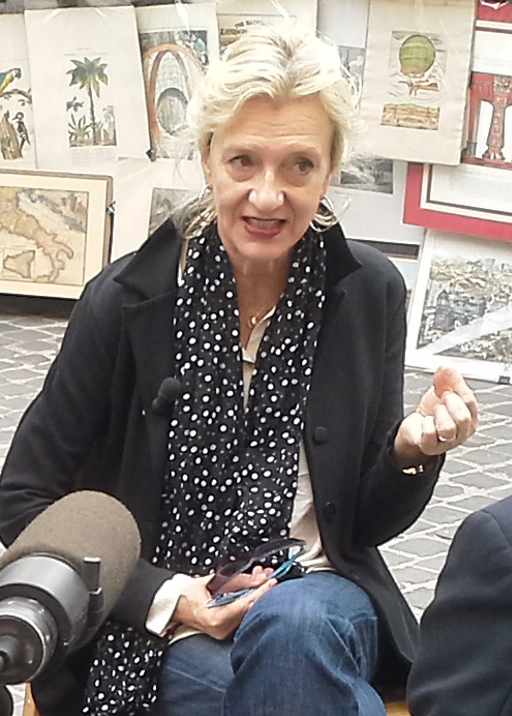
Elizabeth Strout
It’s easy to feel you are chatting with an old friend – or High School English teacher – when you get the chance to speak with Pulitzer Prize winning author Elizabeth Strout. Though it initially seems her gregarious nature may stand in opposition to the wonderfully dramatic novels she has written, her passion for prose and literature comes through free and clear.
Ms. Strout is the author of five books, including her Pulitzer prize winning collection of short stores, Olive Kitteridge, and her most recent novel The Burgess Boys. Her newest book takes readers on a “fluid and compassionate” journey through the family-based struggles of three Maine-born siblings, the New York Times says.
The author will appear at the Wilton Library on Thursday, April 10 to discuss the new book as part as the library’s Author Talk series.
In asking the novelist about her writing process, it becomes clear Ms. Strout has a deep understanding of the art and a clearly thought-out understanding of her own approach to writing.
When asked about French writer Gustave Flaubert’s tendency to spend an entire day of work perfecting a single written word, the Burgess Boys novelist laughed and admitted she was guilty of the same act.
“I am constantly reworking,” she said in an interview by phone last week. “I can be pushing forward with a theme in one part of the book, and two hours later I will go back and completely rewrite the first two chapters. I’m constantly honing sentences to be just what I want. I’m not a person who goes from the beginning to the end and then goes back and cuts and reworks.”
Even the characters she creates are subject to consistent alteration, Ms. Strout said. While individual actors in her novels grow as she begins to better understand them, she said she also uses her own outside observations to craft them as physical beings.
Character development through outside observations is “more tangential and accumulative,” for her, the author said.
“I can tell you having lived in New York for so many years, and having ridden the subway for hours and hours, that I love it: Just staring at people,” she said. “A number of my characters I have visually been able to take back to my work table from the subway. Its not that they were doing anything, but something in their physicality made me say ‘there she is.’”
Though she is a writer who fills her work with “emotional truth” from her “own experiences,” Ms. Strout said she finds character inspiration from strangers, not those close to her.
“I’ve always stared at strangers,” she said. “I love that about New York, its just full of people. I have to write emotionally truthful from my own experience, but I don’t tend to write from people that I know as much as people I have somehow seen at a safe enough distance.”
Like any other job, Ms. Strout said her writing process needs to be structured in one way or another. Most of her life, she said, the author has abided by a rule she calls “three hours, or three pages.”
“I’ve always had a rule for myself called ‘three hours or three pages.’ By pages I mean handwritten sides of the page,” she said. “It can’t just be crap. It has to be something real, it has to be something. And, I’ve almost always done the three pages. I’m comforted by rules, so I don’t have to get super anxious or crazy. I’ve got three hours, three pages, or both.”
However, those nights where she has left a “marble” of a thought behind on her working table often lead to the most fruitful days.
“The best scenario is when I have left my day’s work from the day before left with a little marble of something in my mind so that I can go something that feels very pressured, and that’s the best thing. But, that doesn’t happen always,” she said.
Though some media attention has been placed on the author’s ability to follow-up on her Pulitzer Prize winning Olive Kitteridge, Ms. Strout says the award has put little more pressure on her process than she already had before.
“Its always been difficult for me to put out a book because I have very high standards for myself,” she said. “Whether I won that prize or not, I would still be struggling to put out the best book I could put out. Its always been hard. I’m not the kind of person who puts out a book a year, but I’m not complaining, I’m grateful I’ve been able to be a writer, at all.”
Becoming a writer is a lengthy and difficult process for even the most talented of wordsmiths, and when she responded to a question about her own childhood inspiration, Ms. Strout said she believed finding a mentor — or many mentors — is extremely important for a young writer.
“A mentor is a really important thing for a young person who wants to be a writer or anything. These are the people who kind of give you permission, or a ‘go-ahead.’ We underestimate how important those people are to a lot of young people,” she said.
The author also said her parents unending support for her career was extremely important, because belief in a child’s creativity can be very difficult.
“My mother was an English teacher and was always feeding me books and that is just enormously important. For a parent to believe that is enormously difficult. Most parents find it hard to believe their child will be an artist. I think the Irish are great about it. It was hugely important that my mother believed that, of course she lost some cred just by being my mother,” she said.
Ms. Strout will be interviewed on April 10 at Wilton Library by book discussion leader Susan Boyar. A Q&A and book signing will follow the talk. Registration is highly recommended.
Pre-registrants should arrive by 6:50 p.m. to be guaranteed seating; wait-listed and walk-in registrants will be admitted after 6:50 p.m. if space is available.
Information: http://www.wiltonlibrary.org.
0.000000
0.000000




















